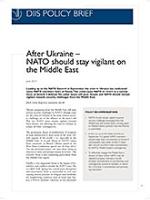NATO After Ukraine
Russia’s annexation of Crimea and the serious crisis in Eastern Ukraine has changed the threat environment for NATO. Despite the current incentive to revert its focus towards Article 5 challenges in Eastern Europe, threats such as the proliferation of weapons of mass destruction, terrorism and instability, all of which emanate especially from the Middle East, remain some of the largest security issues for the Alliance. Therefore, in the aftermath of the crisis in Ukraine and leading into the Wales Summit, it is imperative that NATO does not neglect the many security challenges emerging from the Middle East.
At the Wales Summit in September, NATO should debate the meaning of Ukraine for Alliance policy and address the challenge of remaining vigilant towards Middle Eastern security threats. All members should reconfirm their unrelenting commitment to Article 5, reassuring the member states feeling most threatened by the events in Ukraine, while all members should also commit wholeheartedly to a sustained emphasis on persistent threats coming form the Middle East region. An alliance where everyone – regardless of their security concerns being Article 5 or global – can see clear benefits of membership is the healthiest.
At his May 28 speech at West Point, President Barack Obama placed key emphasis on the role of European NATO allies and partners, maintaining that Europeans ’must pull their weight to counter-terrorism, respond to failed states, and train a network of partners’ beyond Europe’s borders. Therefore Allies should debate at the Summit whether a division of labor with Europeans playing a more active role in the Middle East might be desirable.
Importantly, it is very crucial that NATO still prioritizes its Middle Eastern partners, so that the Alliance can draw on their cooperation in effectively engaging this volatile region, both now and in the future. To paraphrase President Obama, this allows the Alliance, to train, build capacity, and facilitate partners’ opportunities to counter regional threats on the front lines.
Read Jakob Aarøe Jørgensen's policy brief about Nato and the Middle East


